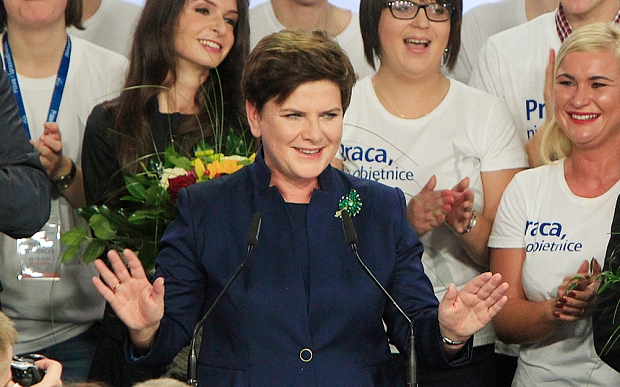European politics hardly needs more excitement, but that’s what in store after the crushing victory for the Law and Justice party (PiS) in Poland’s general election. The party is not just pretty far off the European mainstream; its politics breathe what Adam Michnik, the legendary dissident, has called ‘a combination of an inferiority and superiority complex’. Its redeeming quality now seems to be that it is, nowadays, less nutty. But its politics still have a scent of its past: a social conservatism occasionally lashing modern liberties, a confused and populist economic agenda, and schizophrenia over Germany that swings between pride and feeling of cultural inadequacy. If the party’s rank and file could find a cousin in the UK, it would blend Victorian cultural prejudices with Corbynite economics – and top it off with Basil Fawlty’s imitation of a moustached German.
Instead of running the campaign with Jarosław Kaczyński, the highly divisive party leader and former Prime Minister, as the face of it, PiS found someone else. Beata Szydlo, now tipped to become Poland’s new Prime Minister, is an unknown quantity. But that seems to have worked in the party’s favour. Poles obviously wanted to punish the Civic Platform (PO), the centre-right party that has been in power for almost a decade. Ever since the newsweekly Wprost released the secret recordings of conversations involving PO stalwarts, (including Radek Sikorski, late of the Spectator parish) the party has been on the defensive, managing crisis after crisis. It lost much of its direction when Donald Tusk, the party founder, headed off to Brussels Sikorski left for gardening leave. The party’s early taste for reform was lost, and its arrogance began to wear people thin. Economic liberals close to Leszek Balcerowicz, Poland’s arch reformer, established a new party. With the escalating migration crisis in Europe, Poles rather went for the semi-populist PiS.
The new Polish government carries mixed news for Britain’s renegotiation bid, even if the party shares space with the Tories in the European Conservatives and Reformists (ECR) party group. The PiS government will fight its own fights in Europe; it’s no close friend of trade and market liberalisation. Its hostile sentiments about Russia make PiS part of European Atlanticism, but not necessarily a supporter of the TransAtlantic free-trade pact.
Perhaps more importantly, Europe has now lost one of its few honest brokers. The outgoing Civic Platform government raised Poland’s appetite for being part of shaping European and global policies, but a PiS government will not take up that mantle. A Europe shorn of political leaders will not work to Britain’s favour.






Comments